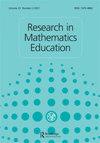Collaborating with industry to highlight the relevance of mathematics
IF 1.1
Q2 EDUCATION & EDUCATIONAL RESEARCH
引用次数: 0
Abstract
ABSTRACTThis study examines whether experiences at industrial facilities help pre-service maths teachers to design authentic mathematical-modelling activities intended for their classroom teaching in high school and how they view the benefits of integrating research and development issues into their instruction. 36 pre-service maths teachers at college in Israel participated the study. The results revealed that the pre-service maths teachers successfully designed authentic activities based on project-based learning that took into account the two cycles of mathematical modelling. The pre-service maths teachers reported that the implementation of the designed activities developed with researchers could serve as a way for them to present their students with a real-life problem that shows them the relevance of mathematics, promotes positive attitudes towards maths, and exposes the students to potential future jobs in the industries. The current study emphasised the use of mathematical modelling as a pathway that links industry and engineering with mathematics education.KEYWORDS: Mathematical modellingrelevance of mathematicsauthentic mathematics task Disclosure statementNo potential conflict of interest was reported by the author(s).Ethical approvalThe authors fulfilled all ethical responsibilities of authors applicable for this journal.Informed consentThe researchers explained the study to the potential participants and told them that they were welcome to take part in the study or to choose not to participate. To protect and respect personal data, pseudonyms are used for the students and this aspect was explained to the students before they started the study.Data availability statementThe data that support the findings of this study are available on request from the corresponding author.与工业界合作,突出数学的相关性
摘要本研究考察了工业设施的经验是否有助于职前数学教师为其高中课堂教学设计真实的数学建模活动,以及他们如何看待将研究和发展问题纳入其教学的好处。以色列大学的36名职前数学教师参与了这项研究。结果显示,职前数学教师成功地设计了基于项目学习的真实活动,考虑了数学建模的两个周期。职前数学教师报告说,与研究人员一起开发的设计活动的实施可以作为他们向学生展示真实问题的一种方式,向他们展示数学的相关性,促进对数学的积极态度,并使学生接触到未来可能在行业中工作的机会。目前的研究强调使用数学建模作为将工业和工程与数学教育联系起来的途径。关键词:数学建模数学相关性真实数学任务披露声明作者未报告潜在利益冲突伦理审批:作者履行了本刊作者的所有伦理责任。研究人员向潜在的参与者解释了这项研究,并告诉他们欢迎他们参加这项研究或选择不参加。为了保护和尊重学生的个人数据,我们使用了假名,并在学生开始研究之前向他们解释了这一点。数据可用性声明支持本研究结果的数据可根据通讯作者的要求提供。
本文章由计算机程序翻译,如有差异,请以英文原文为准。
求助全文
约1分钟内获得全文
求助全文
来源期刊

Research in Mathematics Education
EDUCATION & EDUCATIONAL RESEARCH-
CiteScore
3.00
自引率
15.40%
发文量
40
 求助内容:
求助内容: 应助结果提醒方式:
应助结果提醒方式:


